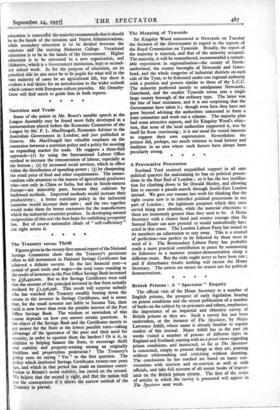The Treasury versus Thrift Figures given in the twenty-first annual
report of the National Savings Committee show that the Treasury's persistent effort to kill investment in National Savings Certificates has achieved a definite success. In the last financial year—a period of good trade and wages—the total sums standing to the credit of investors in the Post Office Savings Bank increased by £38,430,000. But so few Savings Certificates were sold that the amount of the principal invested in that form actually declined by £1,356,296. This result will surprise nobody who has watched the Treasury steadily beating down the return to the investor in Savings Certificates, and is aware that, for the small investor not liable to Income Tax, their yield is now lower than even the pitiable interest of the Post Office Savings Bank. The wisdom or unwisdom of this course depends on how you answer certain questions. Is the object of the Savings Bank and the Certificates merely to get money for the State at the lowest possible rates—taking advantage of the ignorance of the poor and their need for security, in order to squeeze them the hardest ? Or is it, in addition to helping finance the State, to encourage thrift and stability and property-owning among an originally thriftless and propertyless proletariat ? The Treasury's policy rests on saying " Yes " to the first question. The policy which instituted Savings Certificates twenty-one years ago, and which in that period has made an immense contri- bution to Britain's social stability, has rested on the second. We believe that the second is right, and that the nation will rue the consequences if it allows the narrow outlook of the Treasury to prevail.


















































 Previous page
Previous page